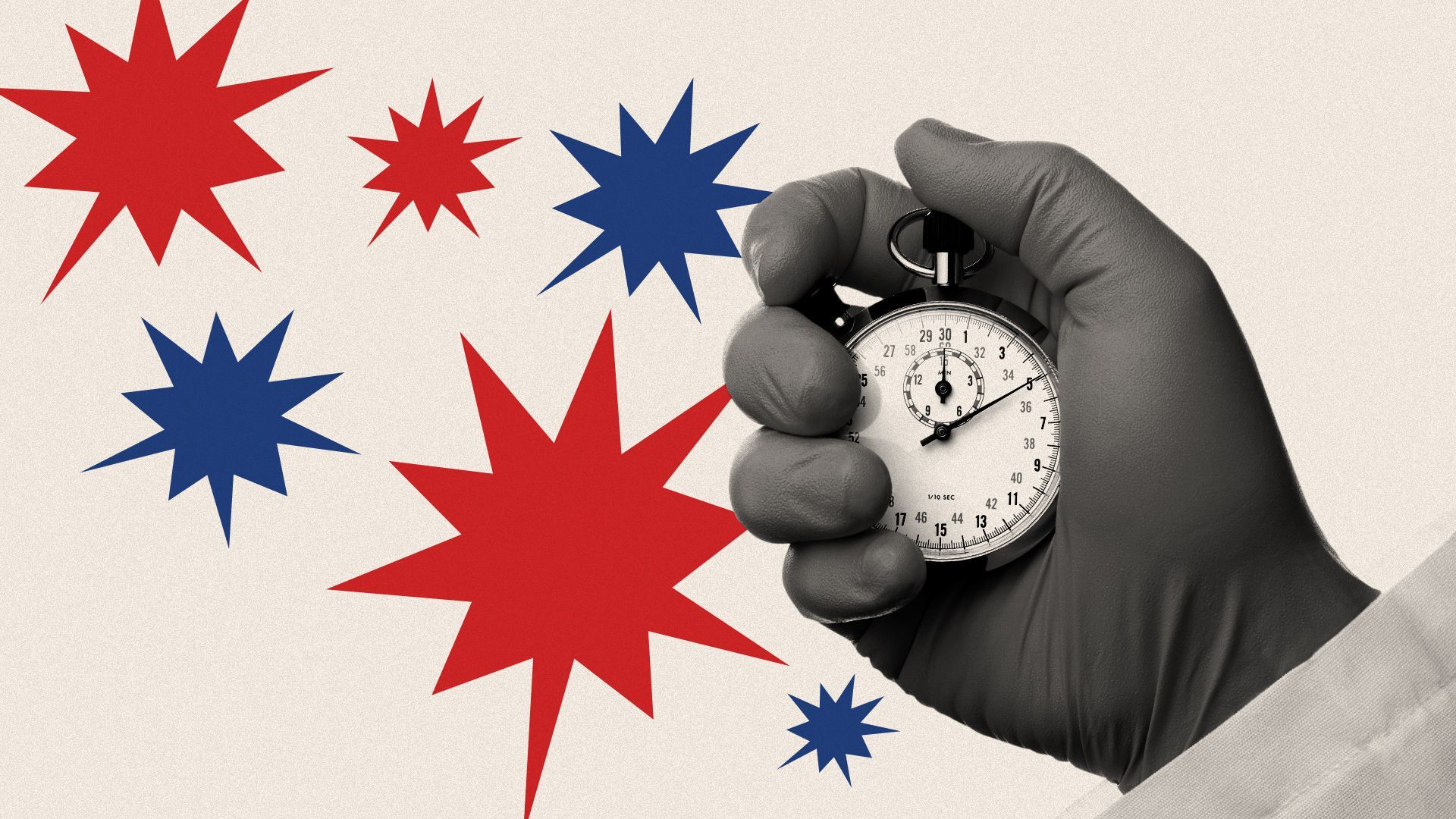The hope behind antibody treatments as a quick coronavirus fix
Add Axios as your preferred source to
see more of our stories on Google.

Illustration: Aïda Amer/Axios
Researchers are racing to develop treatments based on antibodies to block or neutralize the coronavirus in patients, with the hopes these could be ready for possible emergency use by the fall.
Why it matters: Many experts feel antibodies from recovered patients and synthesized antibody drugs could be important bridge treatments for COVID-19 during the months or years until a successful vaccine is available.
What's happening: Antibody therapies can be derived from human plasma or from animals that have been infected, or synthesized.
- The idea is to bolster a person's immune system to stave off infection as a short-term prophylactic or to help an ill individual fight the disease off faster, in an effort that's been used since the 1800s, with mixed results.
- While using any blood product can raise concerns about other infections, antibody therapies can also sometimes backfire and make conditions worse.
- Another issue is the strength in antibodies in these donations are not necessarily consistent, adding uncertainty to its effect.
- And, sometimes the best antibodies are missed as researchers sift through cells in search of them, says Eric Hobbs, CEO of biotech company Berkeley Lights.
Convalescent plasma, from recovered COVID-19 patients, has "investigational" status from the Food and Drug Administration. (To donate blood, check here.)
- It's being used in various clinical trials, in research institutions and hospitals via expanded access (with roughly 11,500 patients so far), and in individuals with serious infections who receive the plasma from their physicians.
- "The safety signal looks good" in very early preliminary data, says Michael Joyner of the Mayo Clinic, which is serving as the lead institution for the FDA's expanded access program. This correlates with indications from small prior studies.
- "We believe this is a good biological shot on goal, but ... we have to be rigorous" in data collection, Joyner tells Axios. He expects some preliminary data to be released in a couple of weeks.
- Beth Shaz, EVP at New York Blood Center, tells Axios they are providing plasma for patient use and for research institutions. They also are working with their hospital partners to "help figure out what type of antibody is best for impacting patient outcomes."
Monoclonal antibody drugs are also being developed to target specific proteins or functions of the SARS-CoV-2 virus to neutralize and/or block it. There are at least 50 candidates in development, including by Regeneron and Eli Lilly.
- "The good thing about a monoclonal is you can give it to sick patients immediately, and it should have an immediate effect. And you can also give it as a sort of temporary vaccine, because antibodies can stay in the bloodstream for weeks and sometimes even months," says Derek Lowe, a drug discovery scientist who wrote a blog on this for Science Translational Medicine.
One of the problems with this coronavirus is that scientists don't yet know which part of SARS-CoV-2 is best to target.
- A majority of monoclonal antibody research is targeting part of the spike protein, with some aiming for the receptor-binding domain (RBD), Lowe says.
- But, an intriguing early stage study released earlier this week may shed some light on how the virus works, he adds.
- In this study — which was only done in cell cultures and must still be tested in both animals and humans — researchers developed a monoclonal antibody called 47D11 that successfully blocked both viruses that cause COVID-19 and SARS.
- Lowe said the neutralizing antibody was able to bind to the spike and bind to the RBD — but this wasn't what prevented the virus from infecting the human cell. "It did stop the virus from infecting the cell because it messes up the next step, via some mechanism we don't understand yet."
- Meanwhile, another early stage study out this week shows early signs that smaller-sized llama antibodies could lead to new drug targets to neutralize SAVS-CoV-2.
What to watch: Technology is speeding up the research.
- Berkeley Lights has developed technology that can deep screen live cells to find the best antibody therapeutic candidates — all within roughly 10 hours, which compares to 90 days via current technology, the CEO tells Axios. While expensive (roughly $2 million a tool), "it's significantly faster ... and, in pandemics, time matters," Hobbs adds.
- Lowe says screening technology like that "has been a big change over the years — people have gotten a lot better at finding and isolating the cells that produce these things."
The bottom line: While significant research remains to be done, there's hope antibody therapies may offer the first round of effective treatments for this pandemic.
